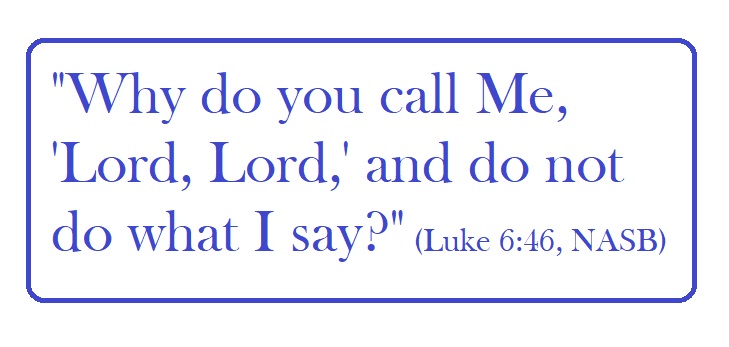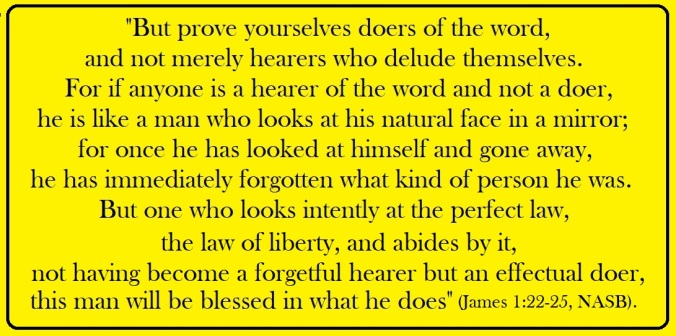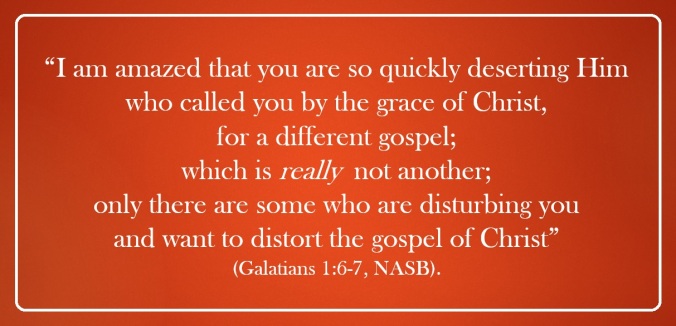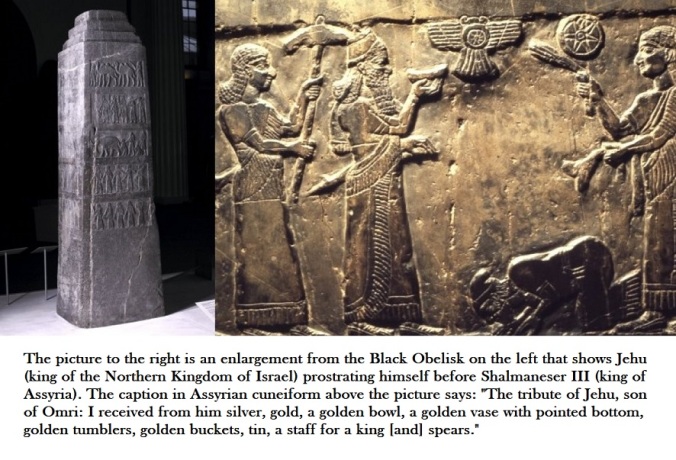“Go therefore and make disciples of all the nations…teaching them to observe all that I commanded you; and lo, I am with you always, even to the end of the age” (Matthew 28:19-20, NASB).
——————–
Contents:
1) A Present Distress (Doy Moyer)
2) Dark Days of Faith (Gary Henry)
——————–
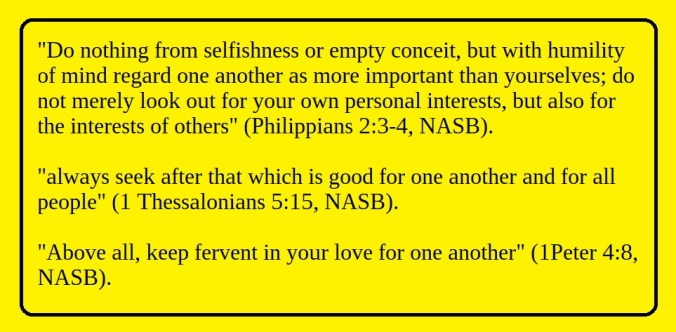
-1-
A Present Distress
Doy Moyer
“I think that in view of the present distress it is good for a person to remain as he is” (1 Cor 7:26).
Christians faced struggles and persecutions peculiar to their profession as Christians. Paul was dealing with a situation in which there was a “present distress.” We don’t know exactly what this crisis was. It could have been some kind of tribulation, persecution, or perhaps a famine or something else. Whatever it was exactly, Paul advised that it would be better under those circumstances not to marry.
A “distress” here is something that creates a great hardship or “severe pressure” (Thiselton). There certainly can be distresses in time that can cause us temporarily to alter our normal habits. We are in such a time now. It is not exactly the circumstances Paul was dealing with, but surely we can see some application. While this virus is not peculiar to Christians, it does affect Christians because our practices involve close personal and social interaction. Christians are going to want to be together. Yet here we are in our own present distress that causes us to change some habits.
This is not altogether unknown to us. We tell people that if they are sick, they should stay home. If they are “shut in,” we do not expect them to meet like normal. If they are in the hospital, no one thinks they are sinning if they cannot meet. We don’t tell the sick that they need to come to services and, if they don’t, they aren’t trusting God enough. These are personal distresses, and people need to use their judgment about what to do. This is not like altering services because I have a ball game to attend.
A present distress requires that judgments be made based upon that particular crisis. Paul advised against marriage, but said it was his judgment and there was no sin involved if someone married anyway. For us, judgments are being made about how much and how often our contact should be. Some will disagree, but here is a critical point: these judgment calls under a present distress are not about changing God’s plans, overturning Scripture, disobeying the Lord’s command to assemble, showing a lack of faith, and so on. Godly people are trying to navigate their way through a storm for which they have little to no precedent. This is temporary. It will pass. The last thing brethren need to be doing right now is calling their brethren’s faith into question because they are making judgments based upon a present distress. Even if you personally don’t think this is a big deal, others do, and we need to help alleviate fear and stress by showing mercy.
Paul advised against marriage because of a present distress. Imagine brethren telling Paul that he was explicitly denying the Lord’s plans for marriage. Imagine Paul being charged with trying to change God’s will or calling into question his faith over this. Paul should have just ignored that present distress and told them not to make any adjustments whatsoever. Who will tell Paul?
It may be that we find ourselves having to adjust to a new normal. It will take a little time to figure it out and make the needed adjustments. Elders and churches have difficult decisions ahead of them. While these decisions and adjustments are being made, we need to avoid vilifying one another. Love is patient and kind.
Many of these matters in our present distress are going to center around how we treat one another. How will we treat our elderly? How will we show love to one another when we ourselves may get sick? How will we serve the needs of those who are ill? How can we build up one another during a time when we cannot be together the way we normally are? How will we show mercy and compassion if we will feel “just fine” but might put others at risk if we are not careful? How will we respect the way others feel, regardless of how we might feel?
If ever there is a time to show love, respect, and mercy, now is it. Pray for each other. Build up one another. Perhaps we may find that a time like this can help us to refocus, to draw closer both to God and each other. Use the time well.
— Via La Vista church of Christ, March 16, 2020
——————–
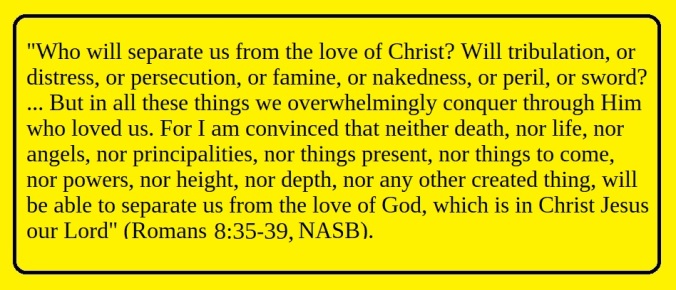
-2-
Dark Days of Faith
Gary Henry
“Then his wife said to him, ‘Do you now still mean to persist in your blamelessness? Curse God, and die.’ ‘That is how foolish women talk,’ Job replied. ‘If we take happiness from God’s hand, must we not take sorrow too?’ And in all this misfortune Job uttered no sinful word” (Job 2:9,10 Jerusalem Bible).
BOTH REVERENCE AND GRATITUDE MUST BE MAINTAINED DURING THE DAYS OF DARKNESS. God is not any less there when life is hard than when it is easy. This is an objective fact, regardless of what our feelings may indicate. The challenge is to discipline our feelings when necessary and maintain our faith in the face of hardship and doubt. Dark days need not be days of utter defeat.
As one of the Lord’s apostles, and having endured more than a few difficult days, Paul could say, “We are hard pressed on every side, yet not crushed; we are perplexed, but not in despair; persecuted, but not forsaken; struck down, but not destroyed; always carrying about in the body the dying of the Lord Jesus, that the life of Jesus also may be manifested in our body” (2 Corinthians 4:8-10). To be “hard pressed” doesn’t mean that we have to be “crushed.” We may be “perplexed, but not in despair.”
To the church in Smyrna, Christ sent this message: “Do not fear any of those things which you are about to suffer. Indeed, the devil is about to throw some of you into prison, that you may be tested, and you will have tribulation ten days. Be faithful until death, and I will give you the crown of life” (Revelation 2:10).
We simply must not allow the onset of pain in our lives to demolish our faith. Is it not a finer and nobler thing to believe when it’s difficult than when it’s easy? After all, it doesn’t take much character or integrity to believe when God’s reality is radiantly shining and all the obvious blessings are flowing our way. “Do not even the tax collectors do the same?” But when the clouds roll in, that is when people of real faith continue to honor God and thank Him for His goodness. When it must meet some significant test, that is when trust means the most. The value of faith doesn’t really become obvious until there is some doubt to be dealt with.
I praise Thee while my days go on;
I love Thee while my days go on:
Through dark and dearth, through fire and frost,
With emptied arms and treasure lost,
I thank Thee while my days go on.
(Elizabeth Barrett Browning)
— Via WordPoints, March 17, 2020
——————–
The Steps That Lead to Eternal Salvation
1) Hear the gospel, for that is how faith comes (Rom. 10:17; John 20:30-31).
2) Believe in the deity of Jesus Christ (John 8:24; John 3:18).
3) Repent of sins (Luke 13:5; Acts 17:30).
4) Confess faith in Christ (Rom. 10:9-10; Acts 8:36-38).
5) Be baptized in water for the remission of sins (Mark 16:16; Acts 2:38; 22:16; Rom. 6:3-4; Gal. 3:26-27; 1 Pet. 3:21).
6) Continue in the faith, living for the Lord; for, if not, salvation can be lost (Heb. 10:36-39; Rev. 2:10; 2 Pet. 2:20-22).
——————–
Tebeau Street
CHURCH OF CHRIST
1402 Tebeau Street, Waycross, GA 31501
Sunday services: 9:00 a.m. (Bible class); 10 a.m. & 5 p.m. (worship)
Wednesday: 7 p.m. (Bible class)
evangelist/editor: Tom Edwards (912) 281-9917
Tom@ThomasTEdwards.com
http://thomastedwards.com/go (Older version of Gospel Observer website without pictures, but back to March 1990)
http://tebeaustreetchurchofchrist.org/
http://ThomasTEdwards.com/audioser.html (audio sermons)
